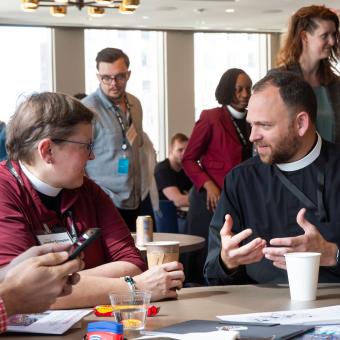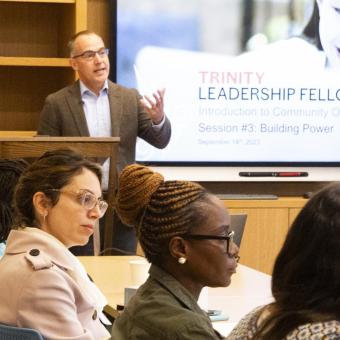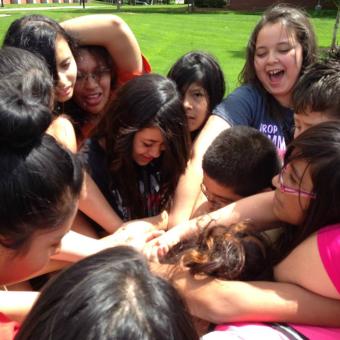Our Vision
The Trinity Church Wall Street Leadership Development program seeks to address urgent gaps in leadership education, grounded in faith and values, for the Church and for people of faith in leadership roles outside the Church. This work is being conceived in collaboration with existing institutions that prepare leaders for the Church, including seminaries, schools of theology, continuing education training programs organized by the Church, closely associated non-profit organizations, and secular leadership education programs.
The goal is to expand opportunities for seminarians, clergy, and laypeople of faith to strengthen their capacities as leaders through faith-driven leadership development. Through our leadership programs, they will acquire the faith-driven mindsets and practical skills needed to inspire and guide congregations, teams, organizations, and communities, empowering them to achieve their common goals.
Trinity works with partners around the world to establish programs focused on specific areas of leadership development through three key approaches:
Leadership Innovation in Theological Education
Enhancing seminary offerings to provide practical leadership training
Innovative trainings for established leaders
Equipping faith leaders in all vocations with the competencies necessary to serve in the modern world
Leadership training for all
Our Faith Leadership Campus digital platform for sharing resources is coming soon!
Leadership Development's work focuses on three priorities supported primarily through grantmaking from Trinity, in partnership with a diverse advisory group of church leaders, seminary faculty, and educators from secular institutions.
Trinity Leadership Fellows
The Trinity Leadership Fellows Program is for individuals seeking to deepen the faith-inspired and values-driven mindsets and skills needed to effectively lead organizations and serve communities in contemporary society, while also building lifelong supporting peer and mentoring relationships.
Fellows will build life-changing relationships with like-minded peers who share the passion for faith-driven leadership that produces positive change in our world.

Leadership Innovation in Theological Education
In 2019, Church Divinity School of the Pacific and Trinity Church Wall Street convened leaders of the Episcopal Church to discuss ways to identify and equip emerging leaders for the Church and the world. Through this and other convenings, Trinity works to promote and share innovations in practical, faith- and skills-based leadership development in theological education.
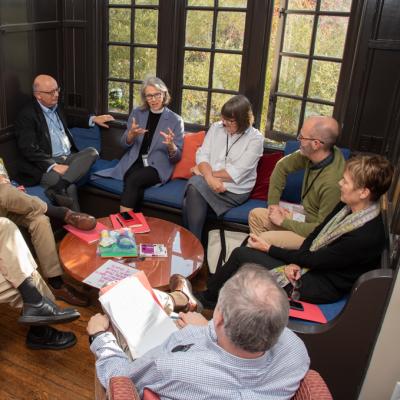
Leadership development for people of faith, lay and ordained
Trinity recently advanced its commitment to leadership development by awarding $1.8 million in grants to seminaries, dioceses and non-profits. Robert Garris, Managing Director for Leadership Development, said, “These grants advance our goal of developing faith leaders, both clergy and lay, whose leadership is embedded in the values of faith and empowered by practical leadership and management skills that bridge congregation and neighborhood.”
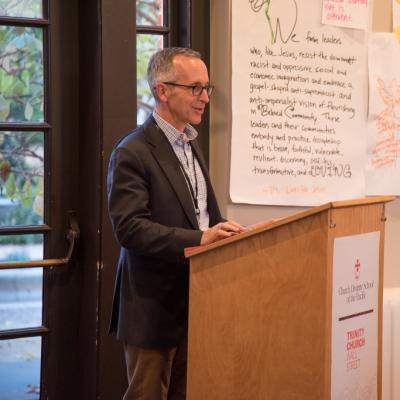
Prospective grant applicants should keep the following priorities under consideration:
- Applicants might be seminaries or divinity schools but might also be dioceses, Church organizations, or other institutions offering non-degree programs of theological education focused on leadership development.
- Proposals should advance innovation, taking new approaches to leadership development that develop practical skills, shaped by faith, for action in the world. Examples of these skills might be (but aren’t limited to) strategy, conflict resolution, team building, congregational development, financial decision making, communications, community engagement, and others, all shaped and exercised through faith and values.
- Proposals must link faith and theological education with mindsets or skills relevant to successful leadership of groups or institutions.
- Proposals should produce resources that can be shared with a broad collaborative community interested in faith and leadership formation, preferably shared digitally.
- Proposals should describe a project that has the potential for independent financial sustainability over time.
Leadership Development Updates
Announcing the 2024 Trinity Leadership Fellows Cohort
April 10, 2024


